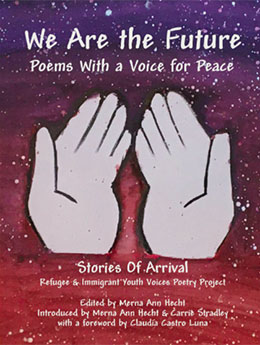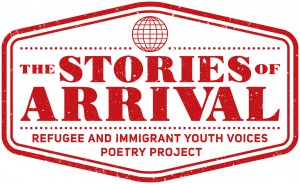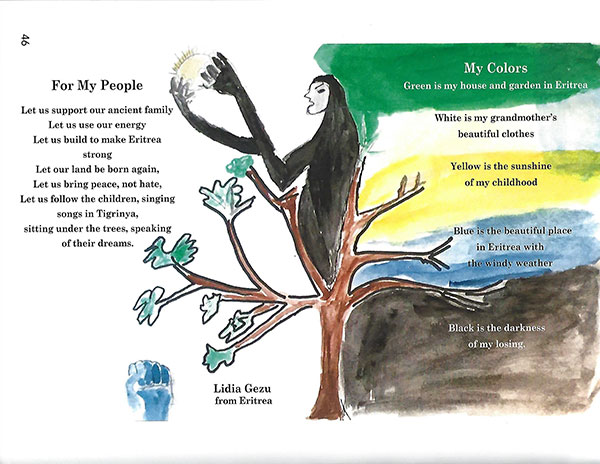 We Are the Future: Poems with a Voice for Peace is impossible to read without being deeply moved by the open hearts and minds of refugee and immigrant youth in the Seattle area, guided by poets and teachers Merna Hecht and Carrie Stradley. Their Stories of Arrival Poetry Project at Foster High School has been ongoing for 11 years, engaging diverse young people in writing poetry. There are students contributing who immigrated from many countries, including Ethiopia, Eritrea, Uganda, Iraq, Afghanistan, Mexico, and Kenya.
We Are the Future: Poems with a Voice for Peace is impossible to read without being deeply moved by the open hearts and minds of refugee and immigrant youth in the Seattle area, guided by poets and teachers Merna Hecht and Carrie Stradley. Their Stories of Arrival Poetry Project at Foster High School has been ongoing for 11 years, engaging diverse young people in writing poetry. There are students contributing who immigrated from many countries, including Ethiopia, Eritrea, Uganda, Iraq, Afghanistan, Mexico, and Kenya.
I continue to open this book, reading and re-reading the poetry by these amazing young writers, absorbing their art, convinced that educators around the globe will find inspiration in this project, develop their own version of it, thereby offering encouragement, visibility, and community to their students.
Here are some samples, each of which is accompanied by illustrations in the book.
My Dad
Who was in the army in Nepal
Who was shot before I was born
Who people tell me was respectful and kind
Who I was told would do anything to make people smile.
Whose heart was open like a flower
Who never said no to his family
Who was full of beauty, how I wish I could see his face just once.
Who was more important to people than words can say,
Who I never had a chance to meet yet who I love dearly,
Who was taken away too soon, who mama misses
Who cared for and protected our family, who I miss every day,
Who is my king, my dad.
— Jharna Subba, from Nepal (page 55)
My Small Town
Let us know you.
Let us feel the breeze of the river
that carries our Mexican history.
Let us know where we came from.
Let us listen to the melody that trees made
when they blew us the air that kept us alive.
Let us know the reasons
of our suffering
that I hear every time I can’t sleep.
Let me know where I came from.
Let me know my nationality.
— Selfer Perez, from Mexico (page 16)
In the section “Meet the Poets,” we learn more about each poet from a photo, a sampling of their artwork, and a statement they’ve written about their lives and what’s important to them.
For his self-portrait, Ahmed Aboker from Kenya writes:
I am from Kenya.
I was born in 2004.
Why do people judge how we look?
Are they sometimes being racist when they do that?
I am writing this because equality is a human right and we all must be equal.

We asked Merna Hecht and Carrie Stradley, co-project directors, about their mission, their reasons for continuing the Stories of Arrival Project for the past 11 years. Merna responded:
What are your hopes with the publication of We Are the Future: Poems With a Voice for Peace?
We hope the book will remind readers of the importance that anyone –youth to elder—needs and has a fundamental right to the space and dignity to speak from their own experience rather than have their experiences and stories told by others. Our hope is that these individual stories can educate the larger community about the experience of migration as it affects young people and their families.
We want this book to serve as a reminder that compassion and understanding are increased, not through sound bites about wars and conflicts, or through overwhelming statistics, but through individual stories that touch our hearts and broaden our sense of what it means to leave a homeland and arrive in a new place.
We hope that the “voices of peace” in the book encourage readers to take action against stereotypes and dehumanizing speech and stand up for and with the wisdom, courage and determination refugee and immigrant youth bring to strengthening our communities.
How do you envision educators in other areas of the country making use of this book?
Carrie and I delight in imagining our book finding its way into middle school and high school classrooms, school libraries, and public libraries in every state! We are aware of the unprecedented need for social and emotional nurturing as schools re-open.
Within the pages of this book, no matter the losses or struggles expressed in the poetry, self- portraits and visual images, there is a spirit of hope that shines through. The poems do not hide from expressing grief, loss, and dramatic life-changes, nor do they omit the power of dreaming for better days and honoring visions of a more equitable and peaceful world for the benefit of all.
Aware of the many complex effects of the pandemic on young people, we hope educators will consider creating space in their classrooms and communities for students to tell their own stories and to bring their voices and artistic expressions to the community.
Our vision is that the book will act as a springboard for similar projects, especially at this time when young people need to re-connect and explore how this year has affected them, their families and their communities.
How do you work with these students to encourage this depth of poetry?
The first word that comes to mind is “trust.” I trust that when our Stories of Arrival students hear me say that poetry is the “language of the heart,” and that writing it is simply “a journey from the heart to the page,” they hear this as true and it gives them an invitation to write their deepest memories and feelings. Most of the students have not written poetry before our project, but they have arrived from countries and cultures where poetry and storytelling have an honored and ancient place in cultural oral traditions. Trust really is the keyword here—creating a safe, nurturing space in the classroom includes reading poems out loud while sitting on the floor in a circle where everyone is equal and no one is above or behind the other.
Also, I spend a great deal of time creating packets of mentor poems and prompts for each year of our project that reflect the themes we’re considering and that include as many poems as I can find written by poets from the countries of origin of the students. I want them to see themselves and their experiences in these poems. Poems are containers for the particularity of memories – tastes, smells, sounds, colors and the faces and names of loved ones and loved places; they can provide a nurturing way to grieve losses and share the struggles of migration while feeling less isolated and alone by voicing these feelings to others. These memories deepen individual and cultural identity which root students in their homelands even as they are also negotiating a new land, language and an identity that is in flux.
What keeps you involved with Stories of Arrival?
Throughout the years of the project Carrie has written and spoken of how a single test, or for that matter many tests, can never show the positive impact that this project has on her students. Year after year, the students inspire us as we witness how they tell their stories through poetry as English language learners navigating a new language while writing from their experiences. When they share their poems and stories out loud, they recognize themselves in each other’s experiences and build a community of support and understanding .Their poetry becomes a bond between them and at the same time it is a pathway to expressing their deepest feelings in a new language.
I have often said that the level of respect that emerges as the students build community with each other is like a model UN where people from different countries and cultures including regions that are engaged in warring factions, sit at one table, break bread together and figure out how to create peace (if only). Our privilege of witnessing this kind of hope for the future and possibility of peacemaking keeps us deeply invested in the project.
Also, our project thrives on community partnerships and community support, and we want to keep reaching out to deepen these relationships and create sustainable inter-generational projects that bring refugees and immigrants into the center of community life — thus we keep moving onward.

Stories of Arrival Refugee & Immigrant Youth Voices Poetry Project
My reaction to this book is expressed well by John Fox, the founder of The Institute for Poetic Medicine, who writes about We Are the Future, “These pages, infused with grit and innocence, trauma and truth, color and the sheer aliveness of these immigrant and refugee youth, offer me everything real and hopeful. This book is at once a miracle and most maddening reminder — these young people, who are often maligned, are here to teach us! Open the pages of this book and take your time with it. I feel certain that when your heart opens reading a particular poem, the young poet who made that poem, if they would see it in your brightening face, he or she would cheer you on. That is the world we are supposed to be living in.”
Purchase We Are the Future from Chin Music Press, Seattle
The Institute for Poetic Medicine
Past Projects from Stories of Arrival, Jack Straw Cultural Center
Bookology’s prior article about Merna Hecht and Our Table of Memories, a Stories of Arrival project

Wonderful article about a meaningful and important project. The young poets’ work is so open and honest. I wish I could give a copy to every teacher I know.